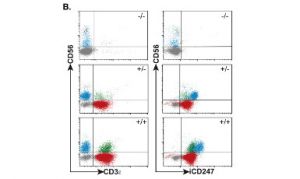 Immunodeficiency caused by lack of the CD247 protein (a component of the T cell receptor, also known as CD3zeta) is a rare disease that manifests itself in the first months of life and whose only treatment is a bone marrow transplant. These patients, who lack a functional immune system, also suffer from recurrent viral infections that delay and impact negatively on the outcome of the Transplant.
Immunodeficiency caused by lack of the CD247 protein (a component of the T cell receptor, also known as CD3zeta) is a rare disease that manifests itself in the first months of life and whose only treatment is a bone marrow transplant. These patients, who lack a functional immune system, also suffer from recurrent viral infections that delay and impact negatively on the outcome of the Transplant.
The function of this protein in T cells has been known for some time. Now, researchers at the Centro Nacional de Biotecnología of the CSIC, in collaboration with other centres, have published an article in the Journal of Allergy and Clinical Immunology in which they analysed NK cell activity in a paediatric patient with a CD247 defect.
"Our results indicate that this protein is essential for correct NK cell maturation," explains Hugh T. Reyburn, principal investigator of the study. Because of a congenital defect, this patient completely lacks the CD247 protein and so, as expected, mature T lymphocytes. "What surprised us is that the NK cells also remained immature and were not activated by signs of infection."
In healthy individuals, NK cells are essential for initiating the response to viral diseases. They are one of the first components of the immune system to detect infected cells and they respond by releasing toxic products to destroy the diseased cells. "The absence of CD247 causes errors in the expression and function of other NK cell proteins, which slows the maturation of these cells,” explains the researcher. However, the lack of T cells further hinders NK cell development, and so the patient studied was unable to fight viral infections."
The authors consider that the results could be important for deciding how to treat patients with immunodeficiencies. In particular, enhancing NK cell function might help prevent viral infections that often complicate the process of transplantation.
- Valés-Gómez M, Esteso G, Aydogmus C, Blázquez-Moreno A, Marín AV, Briones AC, Garcillán B, García-Cuesta EM, Cobo SL, Haskologlu S, Moraru M, Cipe F, Dobbs K, Dogu F, Parolini S, Notarangelo LD, Vilches C, Recio MJ, Regueiro JR, Ikinciogullari A, Reyburn HT. Natural killer cell hyporesponsiveness and impaired development in a CD247-deficient patient. Journal of Allergy and Clinical Immunology 2015 Nov 2. pii: S0091-6749(15)01357-3. doi: 10.1016/j.jaci.2015.07.051.






